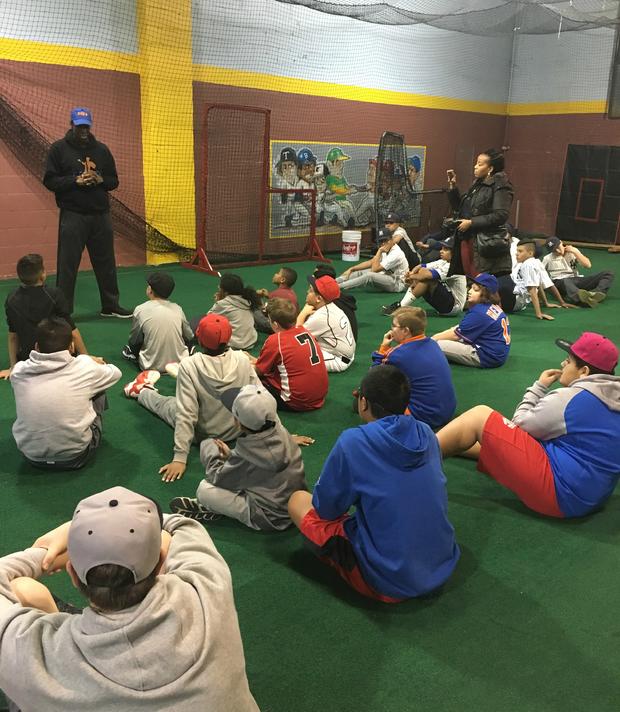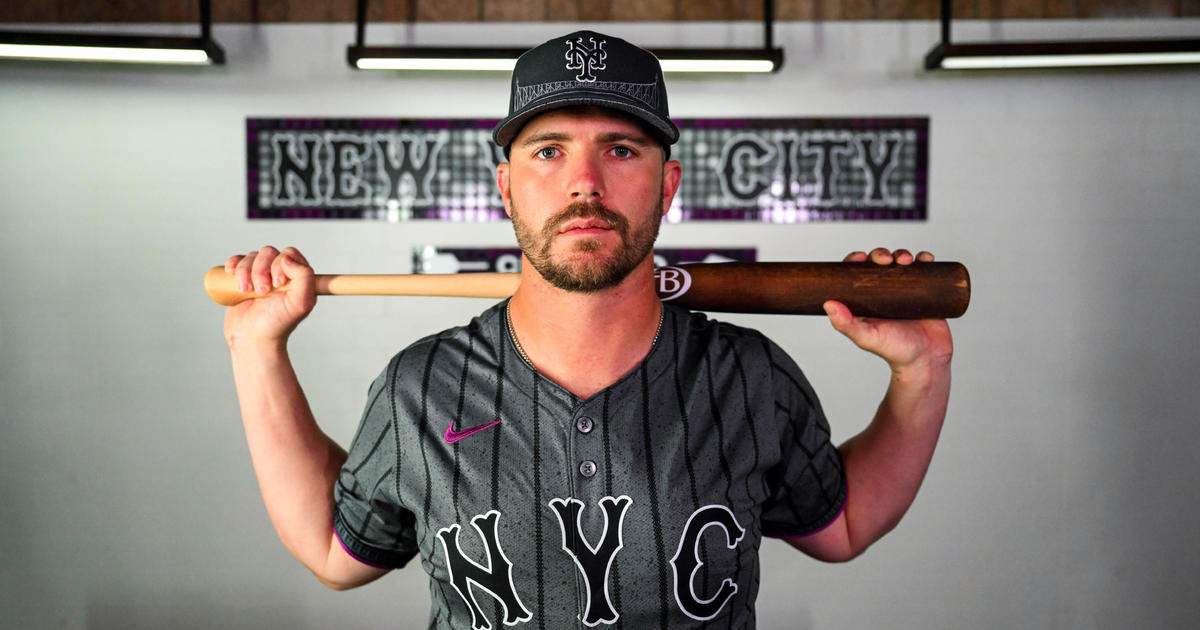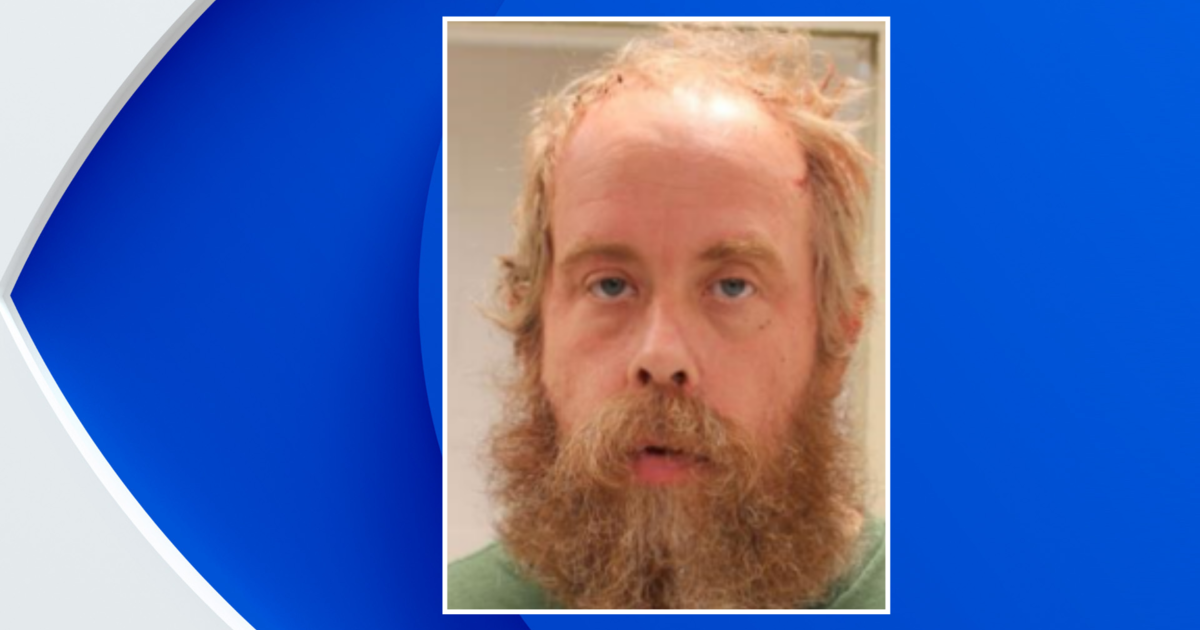Block: Gooden's Charisma Was On Full Display On A December Day In The Bronx
Sitting flush against the wall along the entrance inside the unassuming TM Baseball Academy in the Bronx, Ray Negron was buoyed by organizing an event to help underprivileged kids through baseball, and elated that Dwight Gooden had shown up.
"Doc," an immortal New York sports figure who has been confounded by mortality, paradoxically trying to do right, spoke to, and engaged with, inner city youth on Wednesday at the Bronx baseball training facility nestled in the southeast section of the borough.
Gooden graced pitching mounds for 16 years. Five featured wild success, as he regularly captivated Mets fans with symphonic masterpieces recorded for posterity. The mid-to-late 1980s belonged to him before cocaine and alcohol addiction slowly eroded an obsequious pitching prowess that once defined him.
"I know when I was a kid, if I would have ever had the opportunity to talk to someone and ask questions — what that would have meant to me," Gooden pondered rhetorically to WFAN.com, moments before he'd grace the anxiously awaiting kids.
As a child growing up, Gooden idolized Al Kaline, the Detroit Tigers' Hall of Fame right fielder. Compartmentalizing that memory extracted a nostalgic smile on his once-boyish face, which now sits atop a body too frail to be that of a 52-year-old's.
The 1984 Rookie of the Year wore his own branded "Gooden" hoodie, which fit him loosely, accompanied by pedestrian warm-up sweatpants, and what looked at first glance to be a normal Mets cap. But the word "Mets" was written in Hebrew. That's his way of showing his appreciation to the team's majority owner, Fred Wilpon, who is Jewish.
Killing time in a back office as buzz of his anticipated appearance grew, Gooden recalled proudly how he and his father, Dan Gooden, the person whose dream it was for Doc to be a professional baseball player, would drive about 30 minutes every spring training from their home in Tampa, Florida, to Lakeland, just to watch Kaline.
Yet, Gooden lamented that he never got to meet or speak with his hero, or any other professional player during his formative baseball years. However, those elicited feelings were followed by gratitude and understanding, as he added, "So now that I'm in a position to do that (for these kids), I just try and give back."
With him every step of the way for the last 21 years has been Negron, a special consultant for the Yankees who is entering his 44th year with the organization. He lives for everything Yankees, reminiscent of his tempestuous savior, mentor and father figure, "The Boss," George Steinbrenner. Above everything else, "The one thing I'll never do is make anyone on the Yankees look bad," Negron proclaimed with absolute bias.
MORE: Remembering The 1996 Yankees: The Doc-Boss Story You Don't Know
Negron's baseball functions have ranged over the decades from batboy to the brain child behind creating Hanks Yanks seven years ago — a Hank Steinbrenner-sponsored team and non-profit. Its mission is "making sure kids are playing baseball instead of robbing a store," Negron quipped with his Bronx etiquette. Select members from Hanks Yanks were also in attendance to meet Gooden.
It's transparent that Negron himself is a proud inner city product. Nearly every thought that passes his lips is piggybacked with an unmistakably endearing New York-esque rhetoric, "You know what I'm sayin'?"
Negron first met Doc in 1995 when the right-hander's career was spiraling. Gooden's tenure with the Mets had ended, and he was serving a season-long suspension for repeated violations of baseball's drug policy.
"If it wasn't for his addiction, we wouldn't be friends," the long tenured Yankees consultant admitted.
Gooden's misfortune became Yankees fans' fortune.
"If it wasn't for his addiction, he wouldn't have been a Yankee. If it wasn't for his addiction, he would have never pitched that no-hitter. If it wasn't for his addiction, he wouldn't be here today," Negron stated, increasing his volition with each fact.
Last time Gooden was in the news, it wasn't good. It was June, and following the success of the ESPN 30 For 30 documentary, "Doc and Darryl," quiet rumors of a relapse began to swirl about Gooden, as he appeared jittery and looked unwell in the short film.
Those rumors climaxed in August when he skipped a scheduled WFAN appearance without any notice or public show of remorse. The accusation of being a "complete junkie-addict" hurled at him by former teammate Darryl Strawberry left nothing open to interpretation.
"He was hurt. He was very hurt. It should have been a private thing," Negron said, referring to Gooden's reaction to Strawberry's comments.
Gooden, who is remarkably charming, kind and likeable, plowed through assumptions and mounting concern, and issued a written statement at the time. He never accepted ownership of any reemergence of cocaine or alcohol in his life.
"The one thing about Dwight Gooden is he's not selfish. If anything he's been selfish with himself. But when it comes to these kids -- the most unselfish person ever," Negron said as he watched Gooden pacing before being announced to the crowd of kids and parents.
Stripped of any ego, or perhaps safeguarding himself against saying the wrong thing, Gooden would quickly solicit Negron for last-minute advice. "Stick to baseball with the smaller kids, but be real with the older ones," Negron replied.
The 30-year anniversary of the 1986 Mets world championship and the 20-year mark of the no-hitter that he pitched as a member of the 1996 Yankees have made 2016 a big year for Gooden, a sort of resurgence for the former Cy Young Award winner.
These milestones were remembered, contextualized and illustrated poignantly by the Bronx academy as mere high points in contrast to his checkered story of talent wasted. The co-owners of the community safe haven were particularly pleased with Gooden's message to the kids and authenticity.
"He said 'I made some bad choices that had some bad consequences for me' and I think it's important that our kids, especially these young aspiring baseball players, hear something that genuine from someone who's had the kind of career that he's had," Jessy Rodriguez-Melendez said.
For her husband, Tony Melendez, Gooden's appearance resonated personally.
"What made it more exciting is that my brother came," Tony said, explaining how his brother Mike is undergoing chemotherapy for a form of cancer. He also recalled how Gooden had called his brother to send along words of encouragement days before the event, but gushed over what followed.
"Dwight Gooden called my wife and said, 'Is Mike coming?' And for me, that's huge because he could have easily said, 'Hey I'll be there at 6 p.m.,' but his thought was still on my brother a week later," Tony Melendez said.
A sanguine Gooden ended up giving three hours of himself on Wednesday. Doc even treated all in attendance to a 10-pitch "bullpen session," which drew a quietly stunned response of "he never does this" from Negron. He tossed all fastballs with his trademark carefree ease and distinct whipping motion.
Gooden showed that he's capable of commanding more than just the 17-inch wide home plate that was his canvas for an underwhelming 194 career wins. The persistent question is, can he parlay that and sustain a healthy life? His charisma makes that hard to answer, as his disarming allure can be the perfect masking agent for someone battling addiction.
Negron, who has witnessed Gooden's patterns for over two decades now, starkly concluded, "He was here — today. Hey, that doesn't mean tomorrow he's going to show up, period."
Follow Benjamin on Twitter at @benjaminblock21




